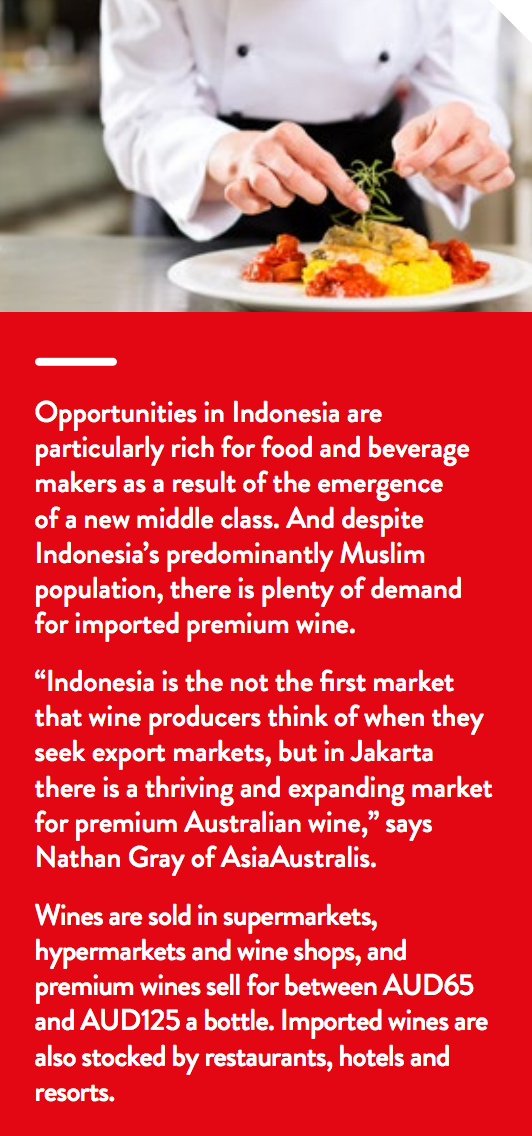Business opportunities in Indonesia
In an era of rapid change in the world’s economic pecking order, Indonesia - a nation of 34 provinces across 17,508 islands - is an emerging Asian giant. Indonesia is the world’s largest archipelago nation, the largest economy in Southeast Asia and 15th largest in the world. It is also the world’s third-largest democracy behind only India and the United States.
Indonesia remains at an earlier stage of development than some of its neighbours, which in some respects can make it a more challenging place to do business. For example, its infrastructure is comparatively less developed than other markets in the region, which can add to transport and other business costs. Its legal systems and regulations can also be challenging at times.
Some of the transformational changes in Indonesia that should have Australian businesses taking notice:
- Indonesia is home to the world’s fourth largest population with around half of its residents under the age of 30
- Indonesia boasts one of the region’s most rapidly expanding middle-classes, with purchasing power forecast to grow strongly. A range of opportunities for Australian businesses continue to open up as the larger and wealthier consumer base creates potential for prospective markets
- Indonesia has outpaced its regional neighbours in recent years, with its economy having averaged over 5 per cent annual growth since 2000
- Indonesia’s GNI per capita was over USD10,500 in 2015, considerably higher than the average for lower middle income nations (around USD6,000). This is bringing significant changes to consumer spending, saving and capital formation patterns
- Indonesia has developed a stable democratic system of government and a market-based economy that is relatively open to foreign investment and participation
- The Indonesian Government committed historically high levels of investment in economic and social infrastructure in 2016
- In its current Master Plan for the Acceleration and Expansion of Indonesia’s Economic Development (MP3EI), the Indonesian Government vowed to streamline the investment and regulatory environment for sectors such as agribusiness, mining and resources, health, education, training and information and communications technology.
Austrade, the Australian government’s overseas trade promotion agency which has a large presence on the ground in Indonesia, has identified a number of key areas and sectors where it believes Australian companies and institutions have the expertise and resources to become more actively and profitably involved. Broadly, Austrade says the main emerging opportunities in Indonesia for Australian businesses are in consumer goods and services, education and training services, knowledge-based industries and technology.
Australian businesses are highly skilled and well-resourced in numerous consumer market segments that are part of the burgeoning Indonesian economy. Among the segments identified for their potential are:
- Design and product development
- New materials, market research and testing
- Retail concepts and online marketing
- Food science and processing
- Cold chain and logistics management
- Consumer finance

A wide range of Australian service industries are also well placed to benefit from strong growth in consumer spending in Indonesia. Opportunities exist for businesses involved in:
- Higher education
- Vocational education and training
- Financial and healthcare services
- ICT and telecommunications
- Tourism, recreation and leisure.
Education
The rapid expansion of Indonesia’s economy is generating large additional demand for education, which Indonesian tertiary institutions have been unable to meet. Demand for more education and training services is to a large degree being determined by skills shortages in key Indonesian industries considered vital to the economy. The shortage of skills training in Indonesia represents a valuable opportunity for Australian educational institutions.
Information and communication technologies
Information and communications technology are central to Indonesia’s economic development aspirations. Previous expansion in the sector has led, among other achievements, to Indonesia becoming one of the world’s biggest mobile phone markets, with 320 million mobile phone subscribers, in 2016.
Food and beverages
Growth in discretionary family income and Western style consumer tastes across Indonesia presents huge opportunities for provision of value-added food and beverage products from abroad.
Manufacturing
Indonesia recently became the 10th-largest manufacturing nation in the world. It’s large manufacturing sector accounts for almost a quarter of the nation’s total GDP and employs over a fifth of Indonesia’s working age population (around 25 million workers).
Infrastructure
One area of infrastructure development that holds great potential is renewable energy. Most power generation in Indonesia is from conventional coal-fired energy sources, with less than 20 per cent from hydroelectric, geothermal and other renewable sources.
Want to learn more? Explore our other Indonesia information categories or download the Indonesia Country Starter Pack.
